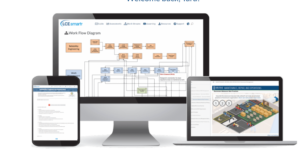An-Australian-Power-Plant-Harnesses-the-Power-of-Reliability-Excellence-207
The Situation
This power station in Australia is a 160 MW, single boiler, coal-fired power plant, supplying 20% of the power required to operate an aluminum smelter. The site is located approximately 30km from the smelter and supplies power through company-owned transmission lines.
The site was struggling with completion of reliability improvements to the fuel delivery system, and plant management was looking for opportunities to reduce operating costs.
The plant’s on-line availability was approximately 97% and fuel burn efficiency was approximately 84%. The plant’s cost to produce power had grown to exceed the costs of public power plants, and was no longer providing savings in power costs at the smelter.
Due to power plant inefficiencies and high cost of operation, the smelter was considering alternative energy resources and was not willing to renew coal mining leases with the state of Victoria, which could potentially cause the power plant to curtail operations.
Plant management decided on the holistic approach of Reliability Excellence implementation with Life Cycle Engineering, Inc. in an effort to improve plant reliability, reduce costs, and regain the confidence of the smelter in providing reliable and cost-effective power to the aluminum smelting operation.
The Challenges
The power station’s primary challenge was to resolve chronic asset problems and reduce maintenance costs while continuing to supply adequate power to their client, the nearby smelter. Poor work planning and materials procurement, coupled with inefficiencies in resource usage, presented significant issues to both the client and the LCE coaching team.
Another challenge that faced both client and consultant was to create an environment to allow participation by plant personnel in focus team activities during the planning, development, and implementation phases of the initiative.
The Approach
Jointly with the client, cross-functional focus teams were created to focus in the areas of leadership engagement, work control & planning/scheduling, reliability engineering, and materials management. The leadership team’s primary focus was management practices and plant-level metrics while providing functional and moral support to the focus teams. The focus teams initially developed processes describing how the site currently conducted daily activities in each area. Using these current processes, the LCE team coached the focus teams in best practices in business, and mentored the teams through development of target processes to improve efficiency in maintenance and materials management, and improved reliability engineering functions that reflected best practices within the operational and functional organizations in the sites. In conjunction with the creation of target processes, roles and responsibilities of individuals involved in the processes were developed, or modified where solid processes already existed.
The plant entered the final planning stage for the 30 day shutdown (scheduled every four years) as the Reliability Excellence effort neared the implementation phase. To support the upcoming outage, the four focus teams were consolidated into a single team for process implementation, and the formal implementation was scheduled for accomplishment during the scheduled outage. While the work control and materials areas implemented processes plant-wide, the reliability team focused on Fuel Delivery System #2, which was rated to be the most critical of all systems at the time.
The new target processes were implemented in a selected pilot area to provide the opportunity to prove the new processes worked, while engaging operations personnel in asset care, autonomous maintenance activities and operating within the guidelines of the new target processes. Concurrently, necessary asset improvements were completed to raise the level of reliability in the assets, providing the foundation for improved preventive and predictive maintenance activities to sustain the assets at a higher level of reliability.
Key performance indicators were developed to provide regular data on PM compliance, schedule compliance, resource utilization and other measures of plant performance and successes.
Following successful implementation in the pilot area, processes and practices were further implemented throughout the site. The plant added three reliability specialist positions to directly support the existing two reliability engineers in analysis and improvement of PM, PdM, and failure analysis efforts.
Conclusions
The successes realized through implementation of the Reliability Excellence processes, coupled with awareness of best practices in plant operations, resulted in transformation of the plant to a proactive culture, with a great sense of pride and ownership in plant assets and operation.
The client continues to develop and improve processes and business rules to further increase the savings and avoidance of costs associated with outages and inefficiencies in the sites.
© 2015 Life Cycle Engineering, Inc.
For More Information
843.744.7110 | info@LCE.com
















